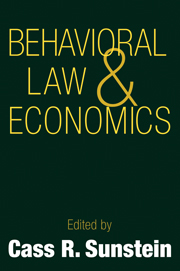Book contents
- Frontmatter
- Contents
- Contributors
- Acknowledgments
- Introduction
- Part I Overview and Prospects
- Part II Heuristics and Biases: Shortcuts, Errors, and Legal Decisions
- Part III Valuation: Values and Dollars in the Legal System
- Part IV The Demand for Law: Why Law Is As It Is
- 13 Some Implications of Cognitive Psychology for Risk Regulation
- 14 Explaining Bargaining Impasse: The Role of Self-serving Biases
- 15 Controlling Availability Cascades
- 16 Cognitive Theory and Tax
- Index
14 - Explaining Bargaining Impasse: The Role of Self-serving Biases
Published online by Cambridge University Press: 05 June 2012
- Frontmatter
- Contents
- Contributors
- Acknowledgments
- Introduction
- Part I Overview and Prospects
- Part II Heuristics and Biases: Shortcuts, Errors, and Legal Decisions
- Part III Valuation: Values and Dollars in the Legal System
- Part IV The Demand for Law: Why Law Is As It Is
- 13 Some Implications of Cognitive Psychology for Risk Regulation
- 14 Explaining Bargaining Impasse: The Role of Self-serving Biases
- 15 Controlling Availability Cascades
- 16 Cognitive Theory and Tax
- Index
Summary
A major unsolved riddle facing the social sciences is the cause of impasse in negotiations. The consequences of impasse are evident in the amount of private and public resources spent on civil litigation, the costs of labor unrest, the psychic and pecuniary wounds of domestic strife, and in clashes between religious, ethnic, and regional groups. Impasses in these settings are not only pernicious, but somewhat paradoxical, since negotiations typically unfold over long periods of time, offering ample opportunities for interaction between the parties.
Economists, and more specifically game theorists, typically attribute delays in settlement to incomplete information. Bargainers possess private information about factors such as their alternatives to negotiated agreements and costs to delay, causing the bargainers to be mutually uncertain about the other side's reservation value. Uncertainty produces impasse because bargainers use costly delays to signal to the other party information about their own reservation value. However, this explanation for impasse is difficult to test because satisfactory measures of uncertainty are rare. With only a few exceptions, most field research in this area has been limited to testing secondary hypotheses such as the relationship between wages and strike duration. Experimental tests of incomplete information accounts of impasse have been hindered by the difficulty of completely controlling important aspects of the experimental environment such as the beliefs maintained by the subjects, and those that have been conducted have generally not provided strong support for the specific models under examination.
- Type
- Chapter
- Information
- Behavioral Law and Economics , pp. 355 - 373Publisher: Cambridge University PressPrint publication year: 2000
- 4
- Cited by



